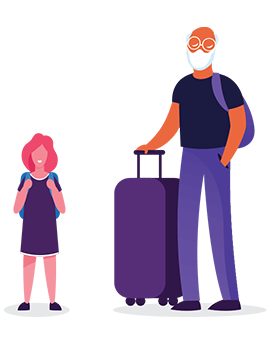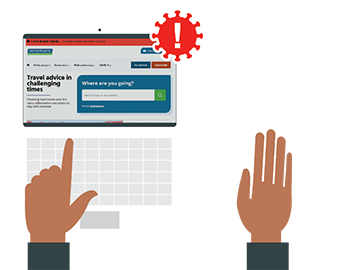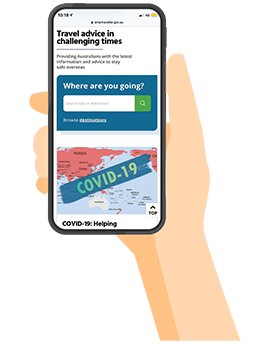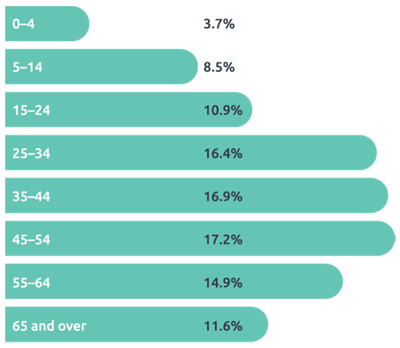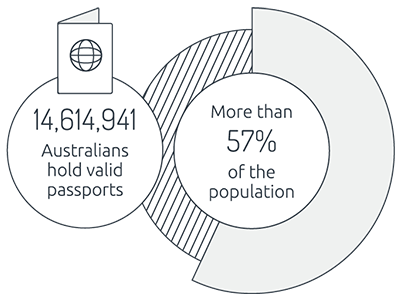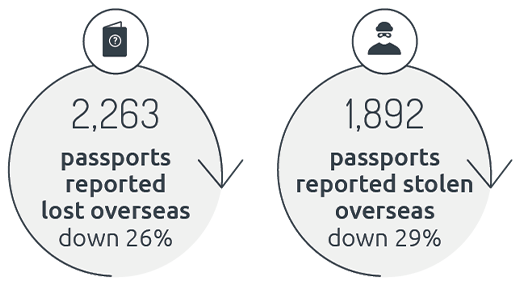Download publication
- Assisting Australians overseas
- Consular services
- Travel advice
- Communication
- Travel insurance
- COVID-19
- Australian travellers
- Consular assistance cases
- Crisis response cases
- Arrest and detention cases
- Summary of consular services 2015–16 to 2019–20
Assisting Australians overseas
Each year the Australian Government provides consular services and assistance to thousands of Australians overseas.
Consular assistance
Australia's posts around the world are committed to assisting Australians overseas and providing critical consular services, with a focus on those most vulnerable. The health and safety of Australians overseas, as well as our staff, is our highest priority.
Most years, under normal circumstances, around one in 1,000 Australians overseas need help from the Australian Government. This might be because of a major emergency, or an accident, illness or crime. When this happens, Australians can seek help from our global consular network.
The COVID-19 pandemic this year has been particularly challenging for Australians overseas and has required the largest and most complex consular response in our history.
Consular services charter
Our Consular Services Charter describes what we can and can't do to help Australians overseas. It explains our expectations of Australian travellers, such as taking personal responsibility for travel choices, safety and behaviour, following travel advice at smartraveller.gov.au and having appropriate travel insurance. The consular services we provide to Australians overseas are not a legal right and travellers shouldn't assume assistance can be provided. In some circumstances, the assistance we can provide may be limited.
We are committed to assisting Australians overseas and providing critical consular services to those most in need.
Consular State of Play is an annual statistical report on consular assistance. While most cases in this report occurred in 2019–20, some remain open from the previous year. This report also has information on travel destinations, age groups, travel insurance and general travel advice. Statistics only tell part of the story. To illustrate the complexity of some of our consular work, we have included short case studies to tell a few of the stories behind these statistics.
Consular services
We aim to empower Australians to help themselves overseas. We deliver consular services to Australians most in need.
Who we are
As part of our role to promote and protect Australia's interests internationally, we manage a network of overseas posts across five continents. Our staff in these posts are experts in their local area and, as part of their role, provide consular services to Australians overseas.
How we help
We provide general travel advice, news and updates as well as official travel advisories for specific destinations. Our travel advice helps Australians understand the risks of their travel and what they can do if they encounter difficulties abroad.
We may also be able to assist Australians overseas with passports and travel documents, serious assaults and other crimes, arrests, detentions and imprisonments, deaths, missing persons and kidnappings, contact with family or friends in Australia, crisis response and support, legalising documents, and overseas voting.
Each case is unique, and our assistance depends on the circumstances and the availability of consular resources. Consular assistance may be limited in some circumstances, for example, if someone has been reckless or acted illegally.
Where we are located
As of June 2020, Australians could seek consular assistance from 181 overseas locations. These include our new embassy in Koror, Palau.
- 120 posts: embassies, high commissions, consulates, multilateral missions, representative offices, in 84 countries
- 48 honorary consuls in 45 countries
- 13 Canadian missions (provide some consular services to Australian citizens) in 18 countries
Case study
Our network of Honorary Consuls play a significant role in providing our consular assistance to Australians. They help in locations where we don't have a diplomatic mission but do have a significant consular workload. For example, during the COVID-19 response, our Honorary Consuls in Latin America worked closely with Australian travellers, our posts in the region and their local contacts to enable the safe return of hundreds of Australians.
Travel advice
Our travel advice helps Australian travellers make informed decisions.
Smartraveller advice levels
The Smartraveller website helps Australians make informed decisions about when and where to travel. It includes travel advisories on 177 destinations covering safety, health, local laws, travel and local contacts.
We assign an overall travel advice level for each destination that reflects the risk to Australian travellers in that country. For each level, we provide advice to help Australians avoid or reduce the risk. We update our travel advisories if there are new or increased risks to Australians.
Smartraveller website
In November 2019, we launched the upgraded Smartraveller website, which is easier to navigate, more accessible and user-friendly.
At the same time, we launched a new subscription service. These changes are part of our efforts to improve how we engage and keep in touch with Australians.
Communication
We provide consular information through a range of communication channels.
Website
The Smartraveller website received more than 3 times the number of website views in 2019–20 than the previous year. This was mainly due to COVID-19 and related travel issues. The quality of engagement also increased, with users viewing more pages in a session and returning to the website more frequently. Overall, 40% of page views were from prior 'smartravellers', compared with 31% last year.
Most visited country web pages
There was a significant increase in Smartraveller website views in 2019–20, largely due to COVID-19. This is reflected in the high number of visits to the top 5 country web pages.
Subscription service
Our new subscription service makes it simple for people to receive travel advice through news and end-of-day emails. Subscribers also receive SMS critical alerts for urgent information if there is a crisis overseas.
Social media
We share consular updates with our social media followers through the Smartraveller Facebook and Twitter accounts, and our overseas posts' social media accounts. We encourage two-way communication through public comment, direct messaging and email. While the rise in followers was partly due to the COVID-19 crisis, numbers have remained high as Australians returned home.
Updates and bulletins
During 2019–20, we issued 2,108 updates to our destination travel advisories, an increase of 343% on last year, and published 25 bulletins with information about various events.
Consular emergency centre
We also operate a 24/7 Consular Emergency Centre for assistance when our posts are closed and for Australians in remote locations. This year, the centre responded to 110,562 phone calls, a 110% increase on last year. Despite the increase, average wait times remained under 3 minutes. This year, we also introduced more ways for Australians to make emergency contact, responding to more than 2,872 SMS messages and 21,276 emails.
Case study
To help Australians stay safe this year, we sent out urgent updates and published bulletins on events including severe weather warnings, the White Island volcano eruption, Hong Kong protests, the Pacific measles outbreak, Brexit, Schengen area entry requirements and COVID-19.
Travel insurance
We encourage Australians to make sure they have the right travel insurance for where they are going and what they are planning to do.
If you can't afford insurance, you can't afford to travel. smartraveller.gov.au/insurance
Australians need to cover their own emergency-related costs if they travel overseas without insurance, or if their insurance doesn't cover their planned destinations and activities or pre-existing medical conditions. Medical treatment overseas or evacuation back to Australia or another country is often very expensive.
Travellers' attitudes
A survey that was conducted in August 2020 of Australians who travelled overseas in 2019–20, or had travel plans that were disrupted, revealed the following attitudes.
Travel
- 41% had an imminent desire to travel, with the majority (60%) expecting to travel within 6 months of the temporary international travel ban being lifted, particularly those under 35
- 33% would consider incurring a 14-day hotel quarantine cost on return to Australia, if able to travel overseas
- 68% incorrectly believed the Australian Government would ensure they got emergency medical treatment needed overseas – this expectation has risen significantly under COVID-19 conditions
Insurance
- 65% of Australians say they understand the possible financial implications of travelling overseas without travel insurance cover
- The most common reason for not taking out travel insurance when booking trips was needing time to research the right policy – highlighting the need for clear, easy-to-use advice (we recorded 160,137 unique views to Smartraveller's travel insurance pages during 2019–20)
- 54% of travellers did not know standard insurance policies don't always cover travel to destinations with Smartraveller Level 3 or 4 advice
- 56% were willing to pay more for specialist insurance that covered travel to Level 3 or 4 destinations, but 27% would consider travelling to such destinations without insurance, rather than paying extra
- 91% would look for insurance that covers against the disruptions of a possible pandemic in future, with 77% willing to pay higher premiums for such coverage
Smartraveller advice
- Smartraveller was the most prevalent source of dependable, government advice – 79% had heard of Smartraveller and 99% of those who visited agreed it met their needs, either completely (66%) or partially (33%)
Source: 2020 Quantum Market Research survey conducted on behalf of DFAT and understandinsurance.com.au
COVID-19
The global pandemic had a significant impact on demand for consular services for Australians overseas.
Unprecedented impact
COVID-19 has presented the largest and most complex consular challenge in Australia's history. It had a significant impact on Australian travellers and expatriates, with many seeking consular assistance for the first time.
International travel slowed and borders closed due to health risks and the significant disruptions to global travel, especially commercial flights.
We raised the travel advice level for countries hard-hit by the virus in the early part of 2020. By 18 March, we had raised the advice level to Level 4 'Do not travel' for all destinations – a first in Smartraveller history.
Help in challenging times
With the crisis changing often and at short notice, we responded to an extraordinary demand for consular assistance from Australian travellers overseas.
During the height of the COVID-19 crisis, our Consular Emergency Centre responded to 74,433 calls from the public requesting advice or assistance. The centre also helped 21 of our posts overseas respond by taking their calls, so these offices could better support repatriation flights and consular services to Australians most in need.
Compared with previous crises, there was an increase in the use of newer communication channels, with 20% of people choosing email or SMS. We received 17,405 emails and 2,633 SMS messages from Australians overseas and their families.
During the pandemic, the Smartraveller website published 1,949 updates to travel advice for 177 destinations and sent more than 14 million subscription emails and 115,000 critical alerts via SMS. We were also active on Smartraveller social media with more than 2,200 Facebook posts, 2,400 Tweets and 13,500 direct message responses.
Case study
Many countries were quickly closing their borders as the COVID-19 outbreak spread. Throughout the pandemic, our posts continued to support a group of Australians to facilitate alternative flight options around the world. Our posts worked to get flight approvals and exemptions from local governments.
Our COVID-19 response
Our COVID-19 consular response was underpinned by our network of Embassies, High Commissions, Consulates, Honorary Consuls and Representative Offices working tirelessly to provide Australians with practical solutions to return home.
Staff from across our global network, including teams in Canberra, drew on their deep understanding of local operating environments and strong diplomatic relationships to:
- provide consular assistance to more than 2,600 Australians impacted by COVID-19 overseas including confirmed cases, those in overseas quarantine and welfare issues
- directly support over 26,600 Australians to return home from across the globe
- negotiate safe passage so that more than 6,500 Australians could disembark from 51 cruise ships overseas
- assist with over 315 flights from more than 90 countries to help Australians return home, including direct facilitation of 64 non-scheduled commercial flights
- organise 'sweeper' flights and ground transport to transfer passengers to international airports and regional flight hubs to get home
- secure seats for Australians on cargo planes, medivac flights, RAAF flights returning from delivering humanitarian supplies, and flights to Australia organised by other governments to repatriate their nationals.
Case study
When the Philippines went into sudden lockdown in March, thousands of Australians across many islands found themselves stranded. Our Embassy in Manila facilitated the safe passage of more than 2,200 Australians (a combination of buses, trucks, ferries and 'sweeper' flights to help Australians return).
Drop in passport applications
COVID-19 had a dramatic impact on passport demand, which fell sharply from more than 40,000 passport applications a week up until February 2020 to around 13,000 between March and June. With fewer people needed to process passport applications, DFAT responded quickly by redeploying staff to support the broader Australian Government response to the pandemic.
In 2019–20, Australia's overseas posts received 5.5% of total passport applications. This equated to 91,964 applications. Due to COVID-19, this was a decrease of 18.4% compared to 2018–19.
The top 2 countries for overseas passport applications were the United Kingdom (16.5%) and the United States (13.8%). The top 5 cities were London (16.5%), Hong Kong (9.6%), Singapore (4%), Auckland (3.6%) and New York (3.2%).
Australian travellers
Australians are keen travellers, with millions taking international trips and living overseas.
Source: Cruise Lines International Association. Note these figures are for the 2019 calendar year.
Australians overseas
Even with this year's travel disruptions, there were more than 8.5 million overseas trips from Australia in 2019–20, but this is down 24% from 11.2 million last year.
In addition, around 1 million Australian citizens were estimated to be living overseas at any given time prior to COVID-19.
Age of travellers
While there were fewer overseas trips, the breakdown by age was similar to last year.
Source: Department of Home Affairs (note these figures are rounded and are for the 2019 calendar year)
Cruise trips
The number of Australians taking cruises during the 2019 calendar year declined slightly, with 1.34 million Australians taking cruises worldwide, down from 1.35 million in 2018. Australia changed its travel advice on 13 March 2020 to 'reconsider your need to travel', including on a cruise ship, and then to 'do not travel' on 18 March 2020.
Passports issued
We issued 1,745,340 passports in 2019–20. While this was down 18% from 2018–19, we received a record number of applications from July 2019 to the end of February 2020, before COVID-19 caused a sharp decline. Even so, we still received around 1,800 passport applications each day in the last quarter of 2019–20, as Australian passports are valued by many as high quality identity documents.
Top 10 destinations
Source: Department of Home Affairs
Consular assistance cases
We expect Australians to take personal responsibility for their travel choices, safety, finances and behaviour overseas.
Number of cases
In 2019-20, there were 14,513 open consular assistance cases. On any one day, there were around 1,200 active cases.
This is up from 13,707 cases in 2018–19 and 11,880 cases in 2017–18.
Types of assistance
| Welfare | 5,085 |
|---|---|
| Whereabouts | 3,478 |
| Death | 1,546 |
| Arrest | 1,443 |
| Hospitalisation | 1,555 |
| Theft from client | 160 |
| Assault on client | 278 |
| Imprisonment | 386 |
| Other | 287 |
Top 5 countries for assistance cases
| Cases | % change | |
|---|---|---|
| Thailand | 753 | ↓ 16% |
| Philippines | 615 | ↓ 5% |
| United States | 613 | ↓ 8% |
| Indonesia | 610 | ↑ 8% |
| China (mainland) | 331 | ↓ 15% |
The top 5 countries for consular assistance cases were the same as last year, although the Philippines overtook the United States. All had fewer cases than the year before.
Case study
The Consular Emergency Centre supports our global consular network by operating 24/7 for urgent consular or passport matters. During the year, the Consular Emergency Centre helped 92 Australians overseas connect with specialist counselling services for urgent support, including Lifeline, Beyond Blue, Rape Crisis Centre and sexual assault counselling services.
Hospitalisation cases
We provide details of local doctors and hospitals in a medical emergency. We may also liaise with local hospitals and authorities and help to communicate with family members or nominated contacts.
In 2019–20 we helped in 1,555 cases of Australians hospitalised overseas. While this was a 3% increase on 2018–19, it represents an overall downward trend of 7% over five years.
Like 2018–19, most hospitalisation cases occurred in Thailand, followed by Indonesia. New Caledonia also remained in the top 5 this year, but the Philippines replaced the United States at number 4.
The Smartraveller website has guidance on taking care of your health while travelling.
Top 5 countries for hospitalisation cases
| Cases | % change | |
|---|---|---|
| Thailand | 162 | ↓ 9% |
| Indonesia | 130 | ↓ 8% |
| New Caledonia | 78 | ↓ 11% |
| Philippines | 75 | New |
| Vietnam | 54 | ↓ 42% |
Case study
An Australian injured while in India needed to return to Australia for medical attention. Despite not having insurance, his family wanted him to return via medical evacuation, which would have cost more than $20,000. Instead, with support from our posts in India and local doctors, he was able to travel to New Delhi and catch a commercial flight home, at a much lower cost.
Death cases
We provide advice and support to families in cases where an Australian has died overseas. This may include liaison with local authorities to assist with funeral arrangements and repatriation of remains.
In 2019–20 we supported families in 1,546 cases of deaths of Australians overseas. While this is 9% less than 2018–19, it is an increase of 2% over five years.
Top 5 countries for death cases
| Cases | % change | |
|---|---|---|
| Thailand | 228 | ↓ 8% |
| Philippines | 160 | ↓ 10% |
| Indonesia | 132 | ↑ 27% |
| Vietnam | 91 | ↑ 16% |
| United States | 82 | ↓ 8% |
Most deaths are a result of an illness, natural causes or accident. Cause of death is determined by local authorities. Not all cases represent deaths that happened in 2019–20. Some death cases may remain open for months or even years, particularly if there are lengthy legal processes or local investigations.
Whereabouts cases
Unexpectedly losing contact with a family member or friend travelling or living overseas can be distressing. We provide assistance in crisis response cases and missing persons cases.
If family and friends have tried to contact someone by all possible means and cannot find them, the Australian Government does what it can to provide advice and support. We can only provide this assistance where there is a well-founded concern. Australians should have realistic expectations about the legal and practical limits to what can be done.
In 2019–20 we provided assistance in 3,478 whereabouts cases (not including COVID-19 related cases), which is down 30% on 2018–19 and represents a downward trend of 38% over five years.
Top 5 countries for whereabouts cases
| Cases | |
|---|---|
| China (mainland) | 29 |
| United States | 27 |
| Thailand | 23 |
| Indonesia | 23 |
| Philippines | 19 |
Welfare cases
We assist in welfare cases for Australians in a range of situations, including cases involving mental health (support in this area is increasing), when someone is sick but not hospitalised, when someone has an appearance in court, and in kidnapping and child abduction cases.
In 2019–20 we provided assistance in 5,085 welfare cases, up 81% on 2018–19. This increase was mainly related to the COVID-19 pandemic. This represents an overall increase of 65% over 5 years.
Australians overseas are encouraged to keep in contact with friends, family and colleagues, especially if they are near a major incident
Top 5 countries for welfare cases
| Cases | % change | |
|---|---|---|
| Philippines | 233 | ↓ 12% |
| Indonesia | 183 | ↑ 5% |
| United States | 182 | ↑ 22% |
| Thailand | 165 | ↓ 23% |
| Syria | 130 | New |
Victims of crime cases
We provide help, including details of local lawyers and interpreters, for Australians who are victims of crime overseas.
In 2019–20 we assisted in 438 victims of crime cases, comprising 160 theft cases and 278 assault cases.
Local authorities are responsible for investigating crimes committed overseas
Top 5 countries for victims of crime cases
| Theft cases | |
|---|---|
| Italy | 33 |
| Ukraine | 8 |
| Cambodia | 7 |
| Japan | 6 |
| Vietnam | 6 |
| Assault cases | |
|---|---|
| India | 15 |
| United States | 15 |
| Indonesia | 15 |
| Fiji | 14 |
| Thailand | 13 |
Passport cases
Passports are important documents. They are proof of identity and citizenship. Despite the best intentions, some passports go astray.
In 2019–20 a total of 4,155 passports were reported lost or stolen overseas, a decrease of 27% on 2018–19.
Travelling Australians must protect their passport and report it immediately if it is lost or stolen so it cannot be misused
Top 5 countries for lost or stolen passports
| Lost passport cases | |
|---|---|
| United States | 422 |
| United Kingdom | 224 |
| Japan | 120 |
| New Zealand | 104 |
| India | 87 |
| Stolen passport cases | |
|---|---|
| United States | 231 |
| Italy | 189 |
| France | 159 |
| Spain | 158 |
| United Kingdom | 156 |
Crisis response cases
We provide support to Australian citizens and permanent residents in international crises and emergencies.
International emergencies
Incidents such as major accidents, natural disasters, terrorist attacks and pandemics require an exceptional response to help Australians in need. In such cases, we may deploy expert teams to assist affected Australians, liaise with families, work with local authorities, and support Australians trying to leave the area. We also provide crisis updates and travel advice to help Australians make informed decisions during a crisis.
In 2019–20 we provided assistance in 3,072 cases to trace the location of Australians potentially caught up in international emergencies. This does not include Australians needing assistance during COVID-19. See details in our COVID-19 section on pages 6–7.
Emergency passports
We may be able to issue an emergency passport to meet immediate travel needs. These are only valid for up to 12 months and, because they are not ePassports, they do not enable visa-free travel to certain destinations such as the United States. We can also cancel lost or stolen passports so they cannot be misused.
In 2019–20 we issued 5,915 emergency passports at overseas posts. This is a decrease of 29% on 2018–19. The top five countries remained the same as last year – the United States, Italy, France, Spain and New Zealand.
Case study
When New Zealand's White Island volcano erupted in December 2019, our Global Watch Office supported consular efforts by acting on early reports to: clarify the situation with the Australian High Commission in Wellington and determine the impact on Australians; issue an alert to government stakeholders; work with domestic agencies and the High Commission on assessing the incident and options for support; and help staff manage public calls to the department's Consular Emergency Centre. This enabled DFAT to respond quickly to support affected Australians and their families.
Arrest and detention cases
We do what we can to ensure Australians arrested or detained overseas are treated fairly under the laws of the country where they were arrested.
Assistance within legal frameworks
Being detained or jailed overseas, or having friends or relatives arrested or in prison overseas, can be distressing and frightening. We cannot provide legal advice, intervene in legal proceedings, override local laws, stop Australians getting deported or get Australians out of prison overseas, but the Australian Government does what it can to help prisoners and their families. This may include providing details of local lawyers, checking on the person's wellbeing, liaising with local authorities and helping to communicate with family members or nominated contacts where Australians overseas are unable to.
In 2019–20 we provided assistance in 1,443 arrest and immigration detention cases. This is an 8% decrease from 2018–19 and a 7% decrease over 5 years.
Immigration detention, where Australians are denied entry to a country or have breached visa conditions, accounted for 376 of these cases, a 6% decrease on last year.
Top 5 countries for arrest and detention cases
| Cases | % change | |
|---|---|---|
| United States | 176 | ↑ 23% |
| Thailand | 125 | ↓ 21% |
| China (mainland) | 103 | ↓ 16% |
| Philippines | 94 | ↑ 7% |
| Indonesia | 85 | ↑ 27% |
Australians need to know and obey local laws. Relevant advice is on smartraveller.gov.au
Drug-related arrest cases
There were 170 drug-related arrest cases in 2019–20. Penalties for drug-related offences in many countries are severe and can include life imprisonment or the death penalty. These laws are strictly enforced and even small quantities of 'soft drugs' can attract heavy fines or jail sentences in prisons that might be much harsher than in Australia.
Travellers should always be aware of what is in their bags, especially when crossing international borders. They should not carry anything for someone else while travelling. Australians who need to take medication on a trip should check if it is legal in countries they are visiting and make sure they have paperwork, such as a doctor's letter or prescription.
Top 5 countries for drug arrest cases
| Cases | % change | |
|---|---|---|
| Thailand | 27 | ↓ 25% |
| Japan | 18 | ↓ 18% |
| Indonesia | 15 | New |
| China (mainland) | 14 | ↓ 7% |
| Philippines | 10 | ↑ 11% |
The Smartraveller website has detailed guidance for Australians arrested or in prison overseas. smartraveller.gov.au/detained
Imprisonment cases
We visit or contact Australians who have been arrested or detained overseas to check on their welfare, and raise any welfare concerns with prison authorities.
In 2019–20 we managed 386 active imprisonment cases. This is an increase of 4% on 2018–19, but a slight decrease of 1% from 2015–16.
The top 5 countries were the same as last year, with all but Vietnam recording an increase. Fraud and drugs cases accounted for most of these imprisonments.
Top 5 countries for imprisonment cases
| Cases | % change | |
|---|---|---|
| China (mainland) | 55 | ↑ 10% |
| United States | 50 | ↑ 11% |
| Vietnam | 34 | ↓ 19% |
| New Zealand | 33 | ↑ 6% |
| Indonesia | 31 | ↑ 15% |
Financial assistance cases
Sometimes emergency situations happen overseas, even for well-prepared travellers. This might include not being able to access money because their wallet or credit cards were stolen, lost or damaged. In most cases travel insurance or family and friends are able to help.
In exceptional cases, we can provide small emergency loans to tide people over until they can sort out the problem, or in extreme cases, to help them get home. There are strict conditions around these loans. Recipients sign a legal agreement to repay the loan by a certain date or in line with a payment program agreed by DFAT.
Demand for ordinary traveller emergency loans continued to fall, with 67 loans issued in 2019–20 compared with 149 in 2018–19. There has been a 66% drop in financial assistance cases over the previous five years.
In 2019–20, we also extended repayable loans to 383 Australians overseas who were affected by the COVID-19 pandemic to enable them and their families to return to Australia.
Summary of consular services 2015–16 to 2019–20
| 2019–20 | 2018–19 | 2017–18 | 2016–17 | 2015–16 | |
|---|---|---|---|---|---|
| Arrest | 1,443 | 1,572 | 1,540 | 1,641 | 1,551 |
| Criminal | 1,067 | 1,171 | 1,155 | 1,237 | 1,198 |
| Immigration | 376 | 401 | 385 | 404 | 353 |
| Prisoner | 386 | 371^ | 386 | 370 | 391 |
| Death | 1,546 | 1,695 | 1,671 | 1,653 | 1,516 |
| Hospitalisation | 1,555 | 1,506 | 1,585 | 1,701 | 1,667 |
| Whereabouts | 30,078* | 4,957 | 2,510 | 2,546 | 5,582 |
| Crisis | 3,072 | 4,593 | 2,001 | 1,851 | 5,003 |
| Routine | 406 | 364 | 509 | 695 | 579 |
| COVID-19 | 26,600 | ||||
| Repatriation | 297 | 23 | 44 | 52 | 76 |
| Welfare | 5,085 | 2,804 | 3,062 | 3,081 | 3,089 |
| Theft | 160 | 257 | 533 | 773 | 1,238 |
| Assault | 278 | 268 | 269 | 317 | 315 |
| Other assistance | 287 | 254 | 280 | 320 | 315 |
| Total cases of assistance | 41,113 | 13,707^ | 11,880 | 12,454 | 15,740 |
| Total excluding crisis whereabouts | 11,037 | 9,114^ | 9,879 | 10,603 | 10,737 |
* This figure includes the number of Australians registered with DFAT's COVID-19 registration system, as at 30 June 2020.
^ Correction to the 2018–19 Consular State of Play.
Privacy policy
Personal information provided to DFAT is protected by law, including the Privacy Act 1988. DFAT's privacy policy is at dfat.gov.au/privacy. We may use personal information to provide consular assistance. In accordance with Australian Privacy Principle 5, information about how we collect, use, disclose and store personal information related to consular cases is contained in our Consular Privacy Collection Statement. This is at dfat.gov.au/about-us/corporate/Pages/consular-privacy-collection-statement
Publication details
ISSN 2205-8842 (print)
ISBN 978-1-74322-558-5 (web page)
ISBN 978-1-74322-559-2 (pdf)
ISBN 978-1-74322-560-8 (booklet)Creative Commons
With the exception of the Commonwealth Coat of Arms and where otherwise noted, such as copyrighted images, this publication is licensed under a Creative Commons Attribution 3.0 Australia licence creativecommons.org/licenses/by/3.0/au/.
The publication should be attributed as the Australian Government Department of Foreign Affairs and Trade Consular State of Play September 2020.
Use of the coat of arms
The terms under which the Coat of Arms can be used are detailed on the Prime Minister & Cabinet's website https://www.pmc.gov.au/government/commonwealth-coat-arms
Sources
The publication is based on data from the Department of Foreign Affairs and Trade's Consular Information System, the Australian Bureau of Statistics and the Department of Home Affairs.
Website
dfat.gov.au/about-us/our-services/consular-services/pages/consular-services
smartraveller.gov.au
@smartraveller.gov.au
@smartravellerTravel advice
smartraveller.gov.au
@smartraveller.gov.au @smartravellerConsular emergency centre (24/7)
+61 2 6261 3305 from overseas
1300 555 135 within AustraliaAustralian embassies and consulates
Passport information
Enquiries about this publication
First Assistant Secretary
Consular and Crisis Management Division
Department of Foreign Affairs and Tradeemail: consular.feedback@dfat.gov.au
web: dfat.gov.au/about-us/our-services/consular-services/Pages/consular-services

